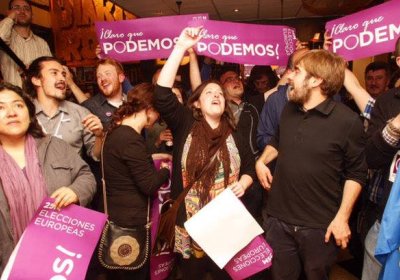The Spanish parliament was the scene of a sharp clash on April 6 over the March 18 European Union-Turkey “pact of shame” that will return up to 50,000 asylum seekers from Greece to Turkey. The asylum seekers — most fleeing from the Syrian civil war — will then be placed in an archipelago of detention centres.
Acting Spanish prime minister Mariano Rajoy, of the conservative People's Party (PP), defended the agreement, saying “things are getting better, we have a procedure”.
Spain
It is very hard to find words that can even begin to describe how progressive people all over Europe are viewing the “pact of shame” over refugees reached between the European Union and Turkey on March 18.
For €6 billion, the promise of accelerated EU access and a conditional end to Turkish citizens requiring visas to enter the EU, the agreement makes the repressive Turkish government of Recep Tayyip Erdogan the main cop controlling the flow of refugees towards Europe.
In the face of the brutal and immoral reaction of the European Union to the tens of thousands of refugees fleeing into Europe from wars and poverty in the Middle East and North Africa, Barcelona council has taken the initiative to set up a network of Mediterranean city councils prepared to welcome and house asylum seekers.
Barcelona is already part of a broader network of European cities welcoming refugees.
 All media outlets in the Spanish state were dominated by the images of two men on March 1: one was leaving jail near the northern city of Logrono to the cheers of inmates he was leaving behind; the other was trying to convince the Spanish parliament in Madrid to vote him in as prime minister.
All media outlets in the Spanish state were dominated by the images of two men on March 1: one was leaving jail near the northern city of Logrono to the cheers of inmates he was leaving behind; the other was trying to convince the Spanish parliament in Madrid to vote him in as prime minister.
 Arnaldo Otegi on his release from jail on March 1.
There were celebrations in the Basque Country and among solidarity activists around the world on March 1 as Basque political prisoner Arnaldo Otegi was released from a Spanish jail after more than six years.
Otegi, a leader of the Basque struggle for self-determination, was jailed by the Spanish state for politically organising in support of Basque independence.
Arnaldo Otegi on his release from jail on March 1.
There were celebrations in the Basque Country and among solidarity activists around the world on March 1 as Basque political prisoner Arnaldo Otegi was released from a Spanish jail after more than six years.
Otegi, a leader of the Basque struggle for self-determination, was jailed by the Spanish state for politically organising in support of Basque independence.
Spain could go without a government for several more months after left-wing anti-austerity party Podemos cancelled talks with the main opposition party, the Spanish Socialist Workers Party (PSOE), TeleSUR English said on February 24.
Podemos walked away from talks when the PSOE tried to make a deal with the right-wing Citizens party.
Since Spain's December 20 elections produced no clear majority, debate has raged over what sort of government should be formed.
The governing conservative People's Party (PP) won 123 seats in the 250-seat Congress and the right-populist Citizens won 40. On the left, the main opposition Spanish Socialist Workers Party (PSOE) won 90 seats, while radical anti-austerity party Podemos and the three alliances in which it took part together with nationalist forces won 69.
The article below is by Pablo Iglesias, secretary-general of the radical Spanish political force Podemos. It abridged from the January 24 El Pais and was translated from Spanish by Dick Nichols.
***
The result of the December 20 election put an end to Spain's political shift-system. It opened up the historic possibility of our country having a government not exclusively dominated by the old party machines that have shared power over the last decades.
What was the central message of the December 20 Spanish general elections, which was “won” by the governing conservative People's Party (PP) of Prime Minister Mariano Rajoy with only 28.72% of the vote, 3.6 million votes less than the last national poll in 2011?
Why did the opposition Spanish Socialist Workers Party (PSOE) greet its worst ever result —22.01%, 1.4 million votes less than 2011 — with a sigh of relief?
The statement below was released by four mayors of cities in the Spanish state — Barcelona, Cadiz, Zaragoza and A Coruna — and signed by many well-known figures from Spanish media and culture. It was translated for Green Left Weekly by Dick Nichols.
* * *
The brutal attacks in Paris on November 13 were designed to install a climate of terror in the population, raising walls of suspicion and hatred between neighbours, shattering community life and bringing the politics of fear into our daily lives.
The November 13 terrorist attacks in Paris were an ideal political gift for Europe's warmongers. It offers a chance to fulfill some previously out-of-reach dreams — such as restoring Germany to a fully-fledged offensive military role or to finally split the British Labour Party between its pro- and anti-war wings.
In Spain, however, the militarists — led by the governing People’s Party (PP) of Prime Minister Mariano Rajoy and the official opposition Spanish Socialist Workers Party (PSOE) — have a tricky job getting the country on board the “war on terror”.
The ongoing war without guns between the Spanish state and Catalonia entered a critical new phase on October 27. On that day, the newly elected pro-independence majority in the Catalan parliament published a draft bill that “solemnly declared the start of the process of creating an independent Catalan state in the form of a republic”.
- Previous page
- Page 10
- Next page









